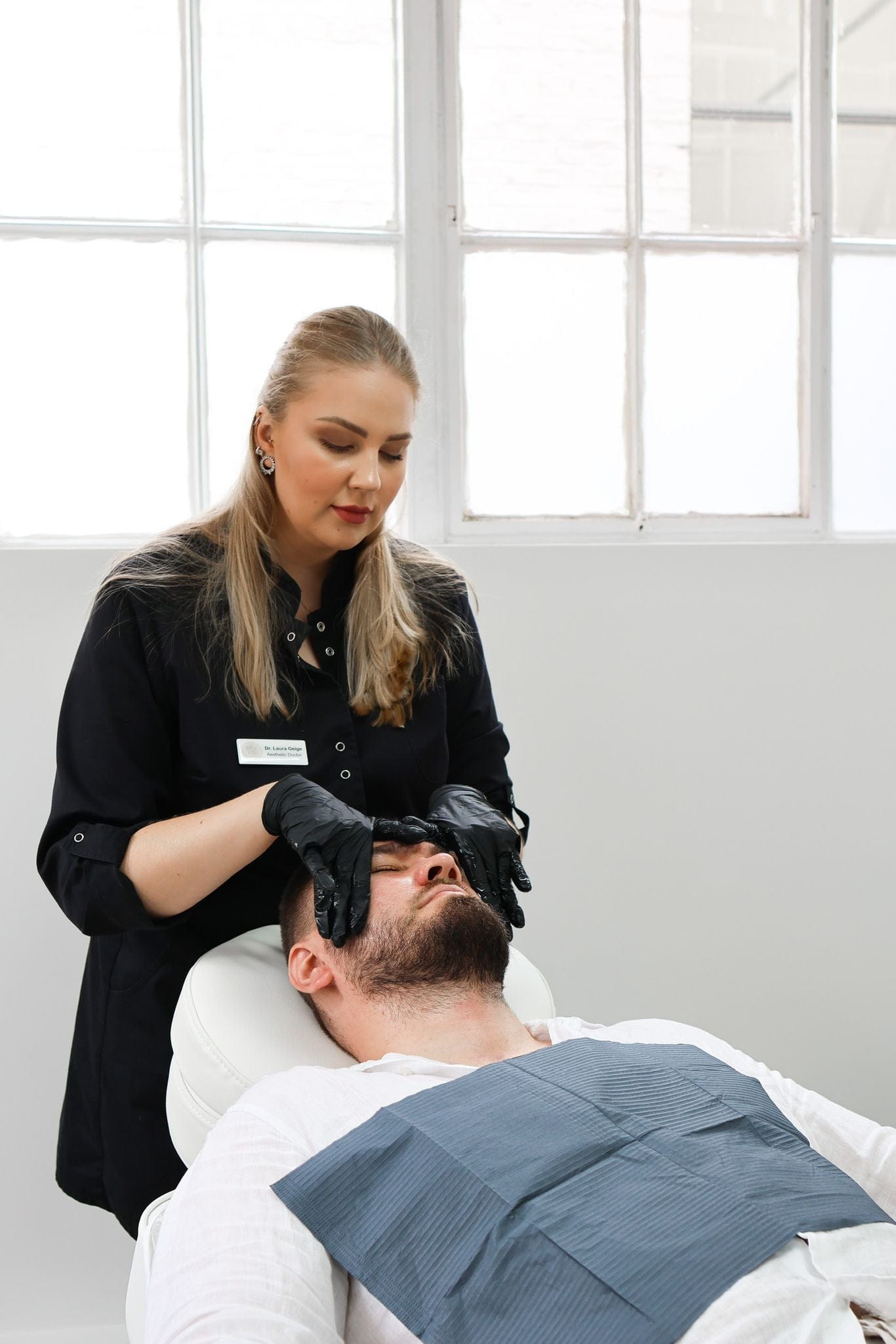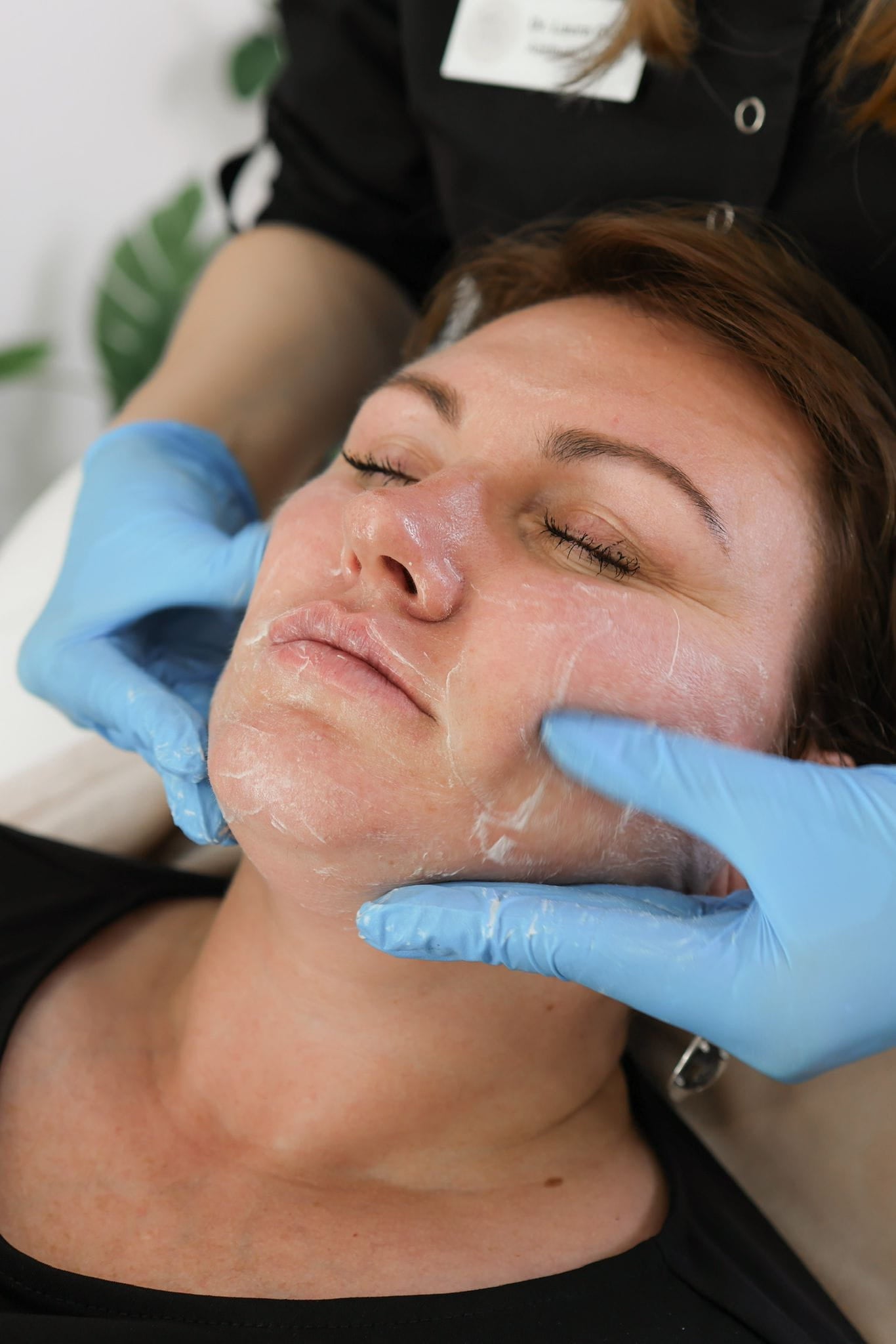Cosmelan Depigmentation Peel: Is It Safe For Sensitive Skin In The UK

Cosmelan Depigmentation Peel Mechanism
Cosmelan Depigmentation Peel is a powerful treatment designed to address pigmentation issues like hyperpigmentation, melasma, and sun spots. It works by utilizing a unique blend of ingredients that target melanin production within the skin cells. This process involves exfoliating the outer layer of skin to remove dead cells and allowing for deeper penetration of the active ingredients.
Active Ingredients
Cosmelan Depigmentation Peel’s mechanism targets melanin overproduction, responsible for pigmentation irregularities like hyperpigmentation and melasma. Its key active ingredient is a combination of kojic acid, hydroquinone, and azelaic acid.
Kojic acid inhibits tyrosinase, an enzyme essential for melanin synthesis, thus reducing pigment production. Hydroquinone directly blocks melanin formation, lightening existing pigmentation. Azelaic acid possesses both depigmenting and anti-inflammatory properties, aiding in the reduction of redness and irritation often associated with hyperpigmentation.
Process of Treatment
The Cosmelan Depigmentation Peel process begins with a thorough cleanse and exfoliation to prepare the skin for treatment. A mask containing the Cosmelan solution is then applied, allowing it to penetrate deeply into the skin’s layers. The peel typically needs to be left on for several hours before being removed by a trained professional.
After the peel application, a post-peel recovery regimen is essential. This often includes specialized creams and sunscreens designed to minimize irritation and promote healing. Regular follow-up appointments with a dermatologist or esthetician are recommended to monitor progress and ensure optimal results.
Effectiveness for Sensitive Skin
For those with sensitive skin, the pursuit of clear, even-toned skin can be particularly daunting. The Cosmelan Depigmentation Peel offers a powerful solution for addressing pigmentation concerns, but its potent ingredients raise valid questions about safety for delicate complexions.
Potential Benefits
The effectiveness of Cosmelan Depigmentation Peel for sensitive skin is a matter of individual response and careful consideration. While the treatment has proven effective in reducing pigmentation for many individuals, its potential to cause irritation or sensitivity necessitates a cautious approach.
Potential benefits include significant lightening of hyperpigmentation, melasma, and sun spots, leading to a more even skin tone. The combination of ingredients in Cosmelan works synergistically to target melanin production at various stages, offering a comprehensive solution for pigmentation concerns.

Risks and Side Effects
Despite its effectiveness, the Cosmelan Depigmentation Peel carries potential risks and side effects that are particularly concerning for individuals with sensitive skin.
- Irritation: The potent ingredients in Cosmelan can cause redness, itching, burning, or a tingling sensation, especially in those prone to sensitivity.
- Hyperpigmentation: While intended to reduce pigmentation, the peel can paradoxically worsen hyperpigmentation in some individuals if not applied and maintained properly. This can occur due to uneven peeling or improper aftercare.
- Allergic Reactions: Some individuals may experience allergic reactions to one or more of the ingredients in Cosmelan, manifesting as rashes, hives, or swelling.
It is crucial for anyone considering Cosmelan Depigmentation Peel, particularly those with sensitive skin, to have a thorough consultation with a qualified dermatologist. They can assess your skin type, medical history, and specific concerns to determine if the treatment is suitable and advise on potential risks and management strategies.
Factors Affecting Sensitivity Response
The effectiveness of Cosmelan Depigmentation Peel for sensitive skin is a matter of individual response and careful consideration. While the treatment has proven effective in reducing pigmentation for many individuals, its potential to cause irritation or sensitivity necessitates a cautious approach.
Several factors can influence an individual’s sensitivity response to the Cosmelan Depigmentation Peel:
- Skin Type: Individuals with naturally sensitive skin, dry skin, or thin skin may be more prone to experiencing irritation from the potent ingredients in Cosmelan.
- Existing Skin Conditions: Pre-existing skin conditions like eczema, rosacea, or acne can exacerbate sensitivity and increase the risk of adverse reactions.
- Ingredient Sensitivity: Some individuals may have specific sensitivities to ingredients like kojic acid, hydroquinone, or azelaic acid commonly found in Cosmelan.
It is crucial for anyone considering Cosmelan Depigmentation Peel, particularly those with sensitive skin, to have a thorough consultation with a qualified dermatologist. They can assess your skin type, medical history, and specific concerns to determine if the treatment is suitable and advise on potential risks and management strategies.
Safety Considerations in the UK
Safety considerations are paramount when considering cosmetic treatments, especially for those with sensitive skin. The UK has strict regulations regarding cosmetic procedures and products, ensuring a certain level of safety. However, individual reactions can vary widely, and it is essential to thoroughly understand the potential risks and benefits before undergoing any treatment.
Regulatory Approval Status
Safety Considerations in the UK for Cosmelan Depigmentation Peel:
Cosmelan Depigmentation Peel requires careful consideration due to its potent ingredients. The UK has strict regulations for cosmetic procedures and products, overseen by regulatory bodies like the Medicines and Healthcare products Regulatory Agency (MHRA).
- MHRA Approval: Cosmelan is authorized for use in the UK after undergoing rigorous safety and efficacy evaluations.
- Qualified Practitioners: It is essential to seek treatment from qualified and experienced practitioners, such as dermatologists or registered aesthetic nurses.
- Patch Testing: A patch test should be conducted prior to full treatment to assess for potential allergic reactions or sensitivities to the ingredients.
- Post-Treatment Care: Adhering to post-treatment instructions provided by your practitioner is crucial for minimizing risks and optimizing results. This includes using prescribed medications, sun protection, and avoiding certain skincare products.
It’s important to remember that individual responses to cosmetic treatments can vary significantly. Consulting with a qualified dermatologist is essential to determine if Cosmelan Depigmentation Peel is safe and suitable for your specific skin type and medical history.
Qualified Practitioner Requirement
Cosmelan Depigmentation Peel is a powerful treatment designed to address pigmentation issues like hyperpigmentation, melasma, and sun spots. It works by utilizing a unique blend of ingredients that target melanin production within the skin cells. This process involves exfoliating the outer layer of skin to remove dead cells and allowing for deeper penetration of the active ingredients.
The effectiveness of Cosmelan Depigmentation Peel for sensitive skin is a matter of individual response and careful consideration. While the treatment has proven effective in reducing pigmentation for many individuals, its potential to cause irritation or sensitivity necessitates a cautious approach.
Several factors can influence an individual’s sensitivity response to the Cosmelan Depigmentation Peel:
- Skin Type: Individuals with naturally sensitive skin, dry skin, or thin skin may be more prone to experiencing irritation from the potent ingredients in Cosmelan.
- Existing Skin Conditions: Pre-existing skin conditions like eczema, rosacea, or acne can exacerbate sensitivity and increase the risk of adverse reactions.
- Ingredient Sensitivity: Some individuals may have specific sensitivities to ingredients like kojic acid, hydroquinone, or azelaic acid commonly found in Cosmelan.
It is crucial for anyone considering Cosmelan Depigmentation Peel, particularly those with sensitive skin, to have a thorough consultation with a qualified dermatologist. They can assess your skin type, medical history, and specific concerns to determine if the treatment is suitable and advise on potential risks and management strategies.
Safety considerations are paramount when considering cosmetic treatments, especially for those with sensitive skin. The UK has strict regulations regarding cosmetic procedures and products, ensuring a certain level of safety. However, individual reactions can vary widely, and it is essential to thoroughly understand the potential risks and benefits before undergoing any treatment.
Safety Considerations in the UK for Cosmelan Depigmentation Peel:
Cosmelan Depigmentation Peel requires careful consideration due to its potent ingredients. The UK has strict regulations for cosmetic procedures and products, overseen by regulatory bodies like the Medicines and Healthcare products Regulatory Agency (MHRA).
- MHRA Approval: Cosmelan is authorized for use in the UK after undergoing rigorous safety and efficacy evaluations.
- Qualified Practitioners: It is essential to seek treatment from qualified and experienced practitioners, such as dermatologists or registered aesthetic nurses.
- Patch Testing: A patch test should be conducted prior to full treatment to assess for potential allergic reactions or sensitivities to the ingredients.
- Post-Treatment Care: Adhering to post-treatment instructions provided by your practitioner is crucial for minimizing risks and optimizing results. This includes using prescribed medications, sun protection, and avoiding certain skincare products.
It’s important to remember that individual responses to cosmetic treatments can vary significantly. Consulting with a qualified dermatologist is essential to determine if Cosmelan Depigmentation Peel is safe and suitable for your specific skin type and medical history.
Post-Treatment Care Guidelines

Cosmelan Depigmentation Peel requires careful consideration, especially for those with sensitive skin. The UK has strict regulations governing cosmetic procedures and products, ensuring a baseline level of safety. However, individual responses can vary significantly.
Safety considerations in the UK for Cosmelan Depigmentation Peel include:
- MHRA Approval: Cosmelan is authorized for use in the UK after rigorous safety and efficacy evaluations conducted by the Medicines and Healthcare products Regulatory Agency (MHRA).
- Qualified Practitioners: It’s crucial to seek treatment from qualified professionals, such as dermatologists or registered aesthetic nurses, who have experience with Cosmelan.
- Patch Testing: A patch test is essential before full treatment to assess for potential allergic reactions or sensitivities to the ingredients in Cosmelan.
- Post-Treatment Care: Strict adherence to post-treatment instructions provided by your practitioner is crucial for minimizing risks and optimizing results. This includes using prescribed medications, sun protection, and avoiding certain skincare products.
Remember that individual responses to cosmetic treatments vary. Consulting with a qualified dermatologist is essential to determine if Cosmelan Depigmentation Peel is safe and suitable for your specific skin type and medical history.
Post-treatment care guidelines for Cosmelan are designed to minimize irritation, promote healing, and maximize results.
Following these guidelines is essential for sensitive skin:
- Sun Protection: Strict sun protection is paramount during the recovery period. Use a broad-spectrum sunscreen with SPF 30 or higher, even on cloudy days.
- Avoidance of Irritants: Refrain from using harsh skincare products, scrubs, or exfoliants that could irritate sensitive skin. Stick to gentle cleansers and moisturizers recommended by your practitioner.
- Hydration: Keep the skin hydrated by applying a prescribed moisturizer regularly.
- No Makeup: Avoid wearing makeup until your skin has fully healed and your practitioner gives you the go-ahead.
- Regular Follow-Ups: Attend all scheduled follow-up appointments with your dermatologist or esthetician. They will monitor your progress, address any concerns, and adjust treatment plans as needed.
Alternatives to Cosmelan Peel for Sensitive Skin
While Cosmelan Depigmentation Peel can be effective in treating pigmentation issues, its potent ingredients may pose risks for individuals with sensitive skin. Alternatives like gentler chemical peels, microdermabrasion, or laser treatments might be more suitable options to explore.
Topical Treatments
For those with sensitive skin seeking to address pigmentation concerns, there are several alternative topical treatments that may offer a less aggressive approach than Cosmelan Depigmentation Peel.
- Vitamin C Serum: Vitamin C is a potent antioxidant that helps brighten the skin and inhibit melanin production. Look for serums containing L-Ascorbic Acid, the most effective form of vitamin C.
- Kojic Acid Creams: Kojic acid is a natural tyrosinase inhibitor that can effectively lighten pigmentation. Opt for creams with low concentrations of kojic acid to minimize irritation.
- Hydroquinone Creams (Under Professional Guidance): Hydroquinone is a powerful depigmenting agent but should only be used under the guidance of a dermatologist due to its potential side effects. It’s available in various strengths, and your dermatologist can determine the most appropriate concentration for your skin.
- Azelaic Acid Treatment: Azelaic acid is another effective depigmenting agent that also possesses anti-inflammatory properties, making it suitable for sensitive skin.
- Niacinamide Serum: Niacinamide can help reduce melanin production and even out skin tone. It is generally well-tolerated by sensitive skin.
- **Retinoids (Under Professional Guidance):** Retinoids, derived from vitamin A, can stimulate cell turnover and help fade pigmentation, but they can also be irritating. Start with a low concentration under the guidance of a dermatologist.
Laser Therapy
Alternatives to Cosmelan Depigmentation Peel for sensitive skin include gentler chemical peels (like lactic acid or salicylic acid peels), microdermabrasion, and laser therapy.
Laser Therapy: Laser treatments can target melanin in the skin effectively. Some lasers are more gentle than others; consult a dermatologist to determine which type is best suited for your sensitive skin.
Chemical Peels (Other Types)
For individuals with sensitive skin seeking alternatives to Cosmelan Depigmentation Peel, several gentler chemical peels might be more suitable. These include:
- Lactic Acid Peels: Lactic acid is a mild alpha-hydroxy acid (AHA) that exfoliates the skin and promotes cell turnover, helping to lighten pigmentation. It’s generally well-tolerated by sensitive skin.
- Salicylic Acid Peels: Salicylic acid is a beta-hydroxy acid (BHA) that penetrates pores and effectively exfoliates, making it helpful for addressing hyperpigmentation caused by acne or sun damage.
Microdermabrasion is another non-chemical alternative that gently buffs away the top layer of skin, revealing brighter and smoother skin. It can help improve pigmentation but may not be as effective as chemical peels for deeper pigmentation issues.
- How Old Do I Have To Be To Get Lip Filler - May 10, 2025
- Neck Line Filler Treatment Near Chelsham, Surrey - May 9, 2025
- Are CBD Vape Pens An Effective Way To Manage Anxiety Symptoms? - May 8, 2025
